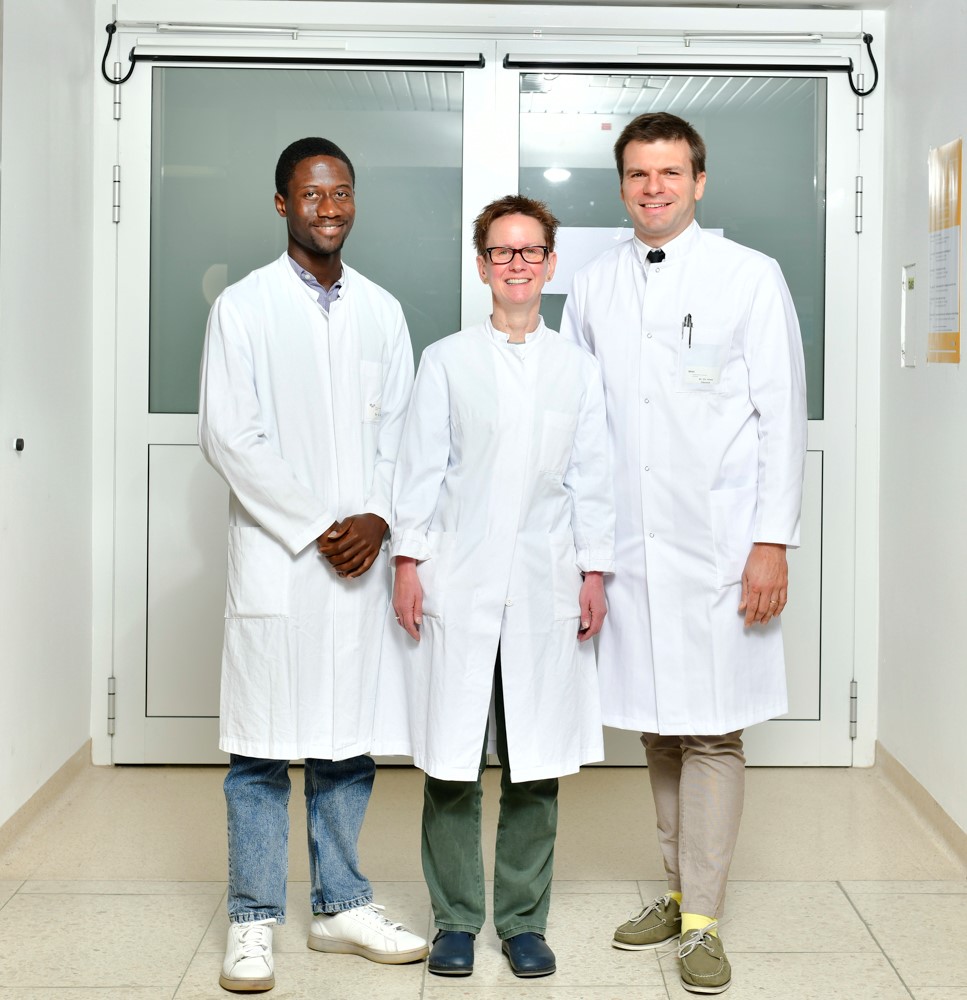System medicine approaches to kidney disease and transplantation

Research Group Leader
- Univ.-Prof. Dr. med. Dipl.-Math. Christian Hinze
Research Team
- Johannes Roeles (Clinician Scientist)
- Julius Sinning (Clinician Scientist)
- Mareike Riechers (Clinician Scientist)
- Suraj Chandwani (Clinician Scientist)
- Francis Forbi (cand. PhD)
- Aigerim Kabulova (cand PhD)
- Theresa Schlegel (cand.Dr.med)
- Lorenz Jahn (cand.Dr.med)
- Erik Figura (cand. Dr.med)
- Michaela Beese (Technician)
Scientific profile
Diseases of the kidney continue to present society with very great challenges and puzzles. On the one hand, there are the immense costs and many individual fates that occur every year as a result of kidney disease; on the other hand, there are the aspects of the kidney that are, unfortunately, largely misunderstood and that lead to these pathological developments. In the case of progressive kidney disease, dialysis or transplantation are often the only therapeutic options. Dialysis must be prevented and postponed as far as possible, and if transplantation is necessary, the transplanted organ must be preserved and protected as best as possible.
The challenge to achieve improvements for patients in these contexts is that 1. a multitude of diseases can lead to kidney damage, 2. kidney diseases are often characterized by a complex interplay of a multitude of different cell types, and 3. good model systems to model the processes in the human kidney are sometimes difficult to obtain.
The ultimate goal of our research group is always to try to improve the therapy of patients with kidney disease. The basic prerequisite for this is often first of all a better understanding of the molecular processes that take place in the individual diseases. In terms of content, this means supporting regenerative potentials of the kidney and interrupting damaging processes.
We believe that this is possible and use state-of-the-art techniques in bioinformatics and molecular medicine such as single cell sequencing (with or without spatial resolution) as well as all current techniques in molecular nephrology to achieve our goals. We always try to work as close as possible to the human system, either directly with human tissue or with human models (organoids, cell culture). When necessary, these approaches are complemented by well-established mouse models.
Selected publications
Hinze C, Kocks C, Leiz J, Karaiskos N, Boltengagen A, Cao S, Skopnik CM, Klocke J, Hardenberg JH, Stockmann H, Gotthardt I, Obermayer B, Haghverdi L, Wyler E, Landthaler M, Bachmann S, Hocke AC, Corman V, Busch J, Schneider W, Himmerkus N, Bleich M, Eckardt KU, Enghard P, Rajewsky N, Schmidt-Ott KM. Single-cell transcriptomics reveals common epithelial response patterns in human acute kidney injury. Genome Medicine. 2022;14:103.
Hinze C, Karaiskos N, Boltengagen A, Walentin K, Redo K, Himmerkus N, Bleich M, Potter SS, Potter AS, Eckardt KU, Kocks C, Rajewsky N#, Schmidt-Ott KM#: Kidney Single-cell Transcriptomes Predict Spatial Corticomedullary Gene Expression and Tissue Osmolality Gradients. Journal of the American Society of Nephrology, 32:291-306, 2021.
Vukićević T*, Hinze C*, Baltzer S, Himmerkus N, Quintanova C, Zühlke K, Compton F, Ahlborn R, Dema A, Eichhorst J, Wiesner B, Bleich M, Schmidt-Ott KM#, Klussmann E#: Fluconazole Increases Osmotic Water Transport in Renal Collecting Duct through Effects on Aquaporin-2 Trafficking. Journal of the American Society of Nephrology, 30:795-810, 2019.
Hinze C*, Ruffert J*, Walentin K*, Himmerkus N, Nikpey E, Tenstad O, Wiig H, Mutig K, Yurtdas ZY, Klein JD, Sands JM, Branchi F, Schumann M, Bachmann S, Bleich M, Schmidt-Ott KM: GRHL2 is required for collecting duct epithelial barrier function and renal osmoregulation. Journal of the American Society of Nephrology, 29:857-868, 2018.
Xu K, Rosenstiel P, Paragas N, Hinze C, Gao X, Huai Shen T, Werth M, Forster C, Deng R, Bruck E, Boles RW, Tornato A, Gopal T, Jones M, Konig J, Stauber J, D'Agati V, Erdjument-Bromage H, Saggi S, Wagener G, Schmidt-Ott KM, Tatonetti N, Tempst P, Oliver JA, Guarnieri P, Barasch J. Unique Transcriptional Programs Identify Subtypes of AKI. J Am Soc Nephrol. 2017 Jun;28(6):1729-1740. doi: 10.1681/ASN.2016090974. Epub 2016 Dec 27. PMID: 28028135; PMCID: PMC5461802.
Aue A*, Hinze C*, Walentin K, Ruffert, Yurtdas Y, Werth M, Chen W, Rabien A, Kilic E, Schulzke JD, Schumann M, Schmidt-Ott KM: A grainyhead-like 2/ovo-like 2 pathway regulates renal epithelial barrier function and lumen expansion. Journal of the American Society of Nephrology, 26:2704-15, 2015.
*equal contribution | #Corresponding authors
Current third-party funding
DFG SFB 1365: Renoprotektion
DFG COVID-19 Focus Funding: “Deciphering kidney injury and repair in COVID-19-associated AKI on a single-cell level”
BIH and MDC Focus Area Translational Vascular Medicin
BIH Clinical Single Cell Sequencing (CSCS) Pipeline
Open positions and PhD projects
We are currently recruiting research assistants, scientific and medical PhD students, and student assistants. If you are interested, please apply by submitting a CV and relevant documents to hinze.christian(at)mh-hannover.de.
Contact
Univ.-Prof. Dr. med. Dipl.-Math. Christian Hinze
Oberarzt der Klinik für Nieren- und Hochdruckerkrankungen
Zentrum Innere Medizin
Medizinische Hochschule Hannover
OE6840, Carl-Neuberg-Str. 1, 30625 Hannover
Tel: +49 511 532 6320, Fax: +49 511 532-18515
Email: hinze.christian(at)mh-hannover.de.